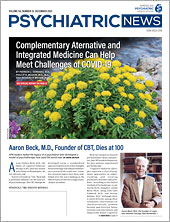A one-day online workshop based on cognitive-behavioral therapy (CBT) principles can significantly boost mood and social support in women with postpartum depression, a study in JAMA Psychiatry has found. Those who attended the workshop in addition to receiving standard care for postpartum depression experienced greater improvements in depression and anxiety symptoms than those who received standard care alone. The women in the workshop also experienced more positive feelings about motherhood after 12 weeks compared with those who did not attend the workshop.
These findings suggest such brief workshops could be an efficient way to increase access to perinatal mental health care, said lead study author Ryan J. Van Lieshout, M.D., Ph.D., the Canada Research Chair in the Perinatal Programming of Mental Disorders at McMaster University in Hamilton, Ontario.
“Even before COVID-19, … time, travel, or finding childcare were significant barriers for mothers seeking postpartum depression care,” Van Lieshout said. Since then, the virus has exacerbated these barriers, he noted. The online workshop can accommodate up to 30 participants, and women can join from the comfort of their own homes. The intervention includes four modules that cover the biology of postpartum depression, cognitive coping skills, behavioral coping skills, and setting goals and an action plan.
Van Lieshout and his colleagues had been conducting some in-person studies with this CBT-based workshop prior to the pandemic, which gave them the tools needed to rapidly pivot to an online mode of care. Unsure how well the workshop—which combines lectures, group discussions, and role-playing activities—would translate to the virtual world, they enrolled 403 new mothers from Ontario for a clinical trial.
All the participants were 18 years or older, had a child younger than 12 months, and had an Edinburgh Postnatal Depression Scale (EPDS) score of at least 10. Half the women were enrolled in the workshop, while the others were put on a wait list and received the workshop after 12 weeks. Both groups had access to standard depression care, including medications and/or psychotherapy, during the 12-week study.
Participants in the workshop group attended a one-day Zoom meeting from 9 a.m. to 4 p.m. that was led by Van Lieshout, a perinatal psychiatrist; Erika Haber, M.Sc, a registered psychotherapist; or Meena Rangan, M.Sc., a psychology graduate student. Van Lieshout noted that the workshop leaders were chosen by necessity (as he wanted to start the trial early in the pandemic and the trio had been trained), but having the workshop leaders with diverse clinical expertise allowed the researchers to test whether this had any bearing on participants’ outcomes.
After 12 weeks, average EPDS scores dropped by 4.82 points among women who attended the workshop, compared with 1.88 points among women receiving usual care alone; based on previous data, the researchers defined an improvement of four points or more as clinically meaningful. The workshop attendees also reported greater improvements in anxiety symptoms, their perceived social support, and infant bonding compared with the usual care group. The women experienced similar improvements regardless of who led the workshop.
Van Lieshout said he believes that the social component of the online workshop helped the participants. “You could see the amazing cohesion and caring among these women during the sessions, and many of the mothers would connect after the workshop and continue supporting each other.”
Van Lieshout told Psychiatric News he is planning a follow-up study that will examine which elements of the workshop have the greatest impact on outcomes. The follow-up study will also employ nurses as the workshop leaders.
Despite the positive results, Van Lieshout cautioned that the one-day workshop is not a replacement for the 12 to 15 sessions of conventional CBT that is demonstrated to be effective for postpartum depression. “The workshop is well suited as a first step in a stepped care approach,” he explained. “We can treat many women with this brief approach, while also identifying women who need more intensive therapies like CBT or medication.”
This study was funded by a grant from the Canadian Institutes of Health Research. ■
“Effect of Online 1-Day Cognitive Behavioral Therapy–Based Workshops Plus Usual Care vs Usual Care Alone for Postpartum Depression: A Randomized Clinical Trial” is posted
here.

